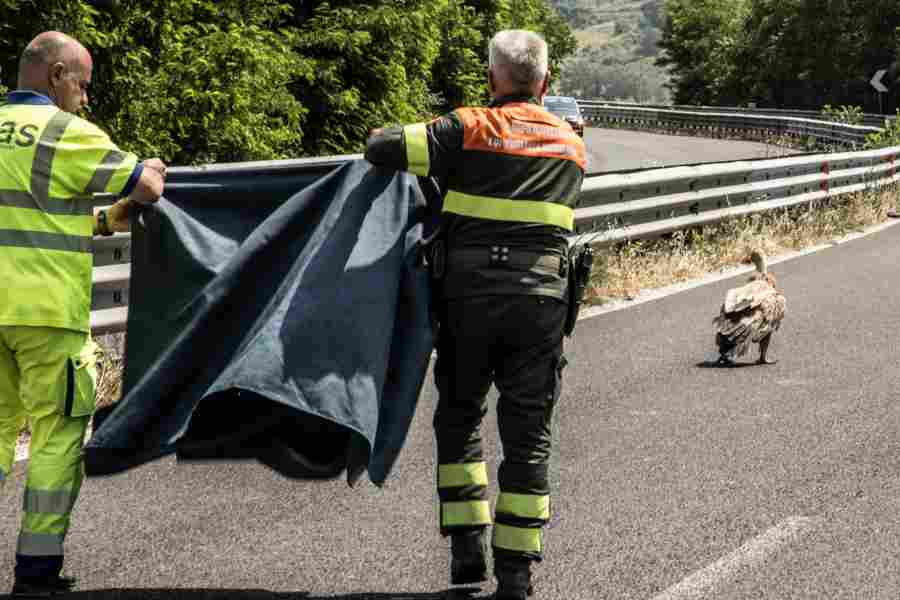
In the morning of the 26thth of February, another Griffon Vulture was found dead by the LIFE Re-Vultures BSPB anti-poison dog unit near Malko Bryagovo village in the Eastern Rhodopes. The vulture most likely died from poisoning, but the team is awaiting necropsy results to confirm. Last year at the same time and in the same place, the BSPB team found dead again, most likely due to poisoning, a Griffon Vulture.
Discovering the dead Griffon Vulture

Nikolay Terziev and his four-legged colleague, Bars the dog, went to look for the Griffon Vulture because the data from his transmitter indicated that something has happened to the bird. The Griffon Vulture found was tagged in 2017 with a GPS-GSM transmitter from a BSPB team under the LIFE Re-Vultures project. The vulture is an adult that was part of a breeding pair.
Surveying the area to avoid more deaths
Experts and police together with Bars searched the area in the following days, especially monitoring the species’ territory.
During the search, The Fund for Wild Flora and Fauna also signalled that a few days earlier, a Cinereous Vulture they observed was feeding south of the dead bird, so the team widened the search area. Fortunately, no other dead animals or suspicious substances were found in the new territory.
Necropsy of Griffon Vulture

With the assistance of police officers the vulture carcass was transported to the Green Balkans Wildlife Rescue Center in Stara Zagora, where veterinarians performed a necropsy and suspected that acute poisoning killed the vulture. Toxicological samples were taken and experts are now awaiting lab results to confirm the cause of death. The necropsy was performed within the Vultures Back To LIFE project.
Update on cause of death
The laboratory results proved that the Griffon Vulture died from poisoning.
Wildlife Poisoning in Bulgaria
The illegal use of poisons and the placing of poisonous baits against terrestrial predators causes irreparable damage, especially to populations of predatory birds, including globally endangered species. The most recent reported case of wildlife poisoning was in September when eight Griffon Vultures and one eagle were poisoned in the Svoge region. In March 2017, over 30 Griffon Vultures were poisoned in the Kresna Gorge, which only recently colonised the area following a reintroduction programme. Currently, Bulgaria is about to adopt one of the most important national strategies for the conservation of biodiversity and endangered species – precisely to combat the illegal use of poisons and poisonous baits in nature.
The VCF is particularly active in fighting this threat and is implementing many projects across Europe and many actions against poisoning. In Europe we are actively pursuing different lines of work to fight this threat, among which is the Balkan Anti-Poisoning Project, funded by the MAVA Foundation. The project is working and funding local partners in five counties (Croatia, Albania, Bosnia-Herzegovina, North Macedonia and Greece) to try to eradicate this illegal and highly damaging practice.
LIFE Re-Vultures

Starting in 2016, the five-year LIFE RE-Vultures project was developed by Rewilding Europe, in collaboration with the Rewilding Rhodopes Foundation the Bulgarian Society for the Protection of Birds, WWF Greece, the Hellenic Ornithological Society and us here at the Vulture Conservation Foundation. The aim of the project is to support the recovery and further expansion of the populations of Cinereous and Griffon Vultures in the cross-border region of the Rhodope Mountain by improving natural prey availability, monitoring movements of birds to help understand the threats they face and carrying out activities that will reduce the mortality of the populations from threats such as illegal wildlife poisoning and collisions with electricity infrastructure.

Vultures Back To LIFE

Led by the wildlife conservation charity Green Balkans, with activities also implemented by the Fund for Wild Flora and Fauna, and bringing together partners from Bulgaria, Spain and Germany, Vultures Back to LIFE aims to reintroduce the cinereous or Eurasian black vulture to Bulgaria. The team will transfer and release around 60 birds, some from captive-breeding, but mostly coming from wildlife rehabilitation centers in Extremadura (Spain) into the wild in Bulgaria as well as creating supplementary feeding stations and improving populations of wild herbivores, improving the nesting conditions and creating artificial nest sites and tackling some of the major threats to vultures in the country such as insulating electricity pylons and illegal use of poison in the nature.




